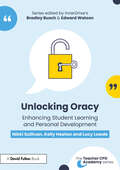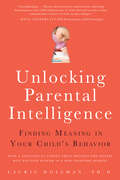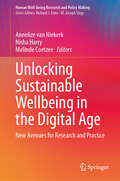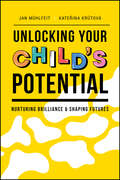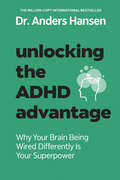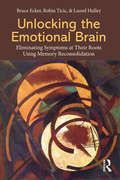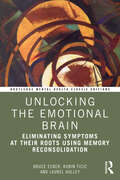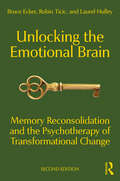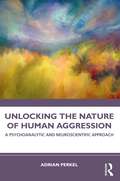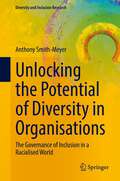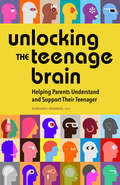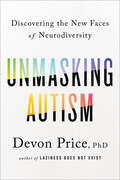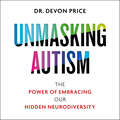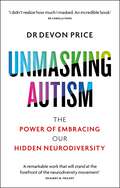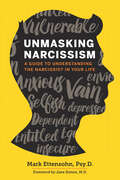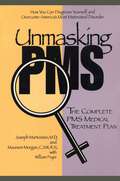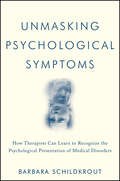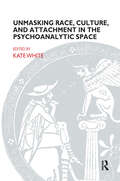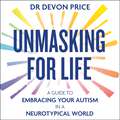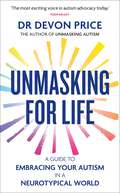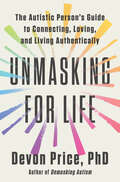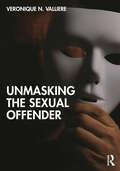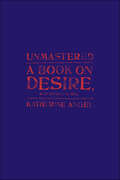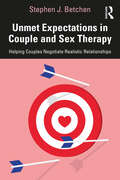- Table View
- List View
Unlocking Oracy: Enhancing Student Learning and Personal Development (The Teacher CPD Academy)
by Nikki Sullivan Kelly Heaton Lucy LowdeOracy plays a pivotal role in education, both as a goal in and of itself and through the role it can play in securing learning. This exciting new book explores how Oracy can support academic success and develop confident communicators who can effectively engage with the world around them and are ready for life beyond school.The book first draws on cognitive science to show how Oracy can be used in the classroom to secure attention and engagement, enhance meaning-making, and for effective retrieval. It then offers strategies for embedding Oracy throughout the school to support debating and communication skills, respectful conversations around emotive and challenging subjects, and students’ wellbeing and confidence. Each chapter features practical classroom examples, research evidence, pitfalls to avoid, and case studies to help teachers apply the ideas to their own context.Part of the Teacher CPD Academy series from InnerDrive, this is essential reading for all teachers and school leaders looking to holistically develop their Oracy provision.
Unlocking Parental Intelligence: Finding Meaning in Your Child's Behavior
by Laurie HollmanIn Unlocking Parental Intelligence, long-experienced psychoanalyst, Laurie Hollman, PhD, encourages parents to find the significance behind their child’s behaviors by becoming “meaning-makers.” Parental Intelligence is explained through compelling and empathic story-telling that answers parents’ questions: “Why do children do what they do? “ “What’s on their minds?” “How can parents know their child’s inner world?" Through a clear five-step approach, parents discover the power and wisdom of a new parenting mindset that helps them learn what their kids think, want, intend and feel. They see actions as communications. They are rewarded with open parent-child dialogue about the underlying problems hidden beneath the behaviors. As they problem solve, parents discover misbehaviors are not only meaningful, but a catalyst to change. Parents and professionals alike will find a new parenting approach from this invaluable book that will reshape families’ lives and guide them through all stages of typical and atypical child development. This accessible read enlightens, uplifts, and relieves while cultivating critical thinking on the part of parents and children as they wrestle with the common, and sometimes desperate vexations of family life.
Unlocking Sustainable Wellbeing in the Digital Age: New Avenues for Research and Practice (Human Well-Being Research and Policy Making)
by Melinde Coetzee Annelize Van Niekerk Nisha HarryThis volume includes global and interdisciplinary reflections for innovative solutions to facilitate wellbeing in the digital age, at individual, team and organisational levels. It provides new perspectives, strategies, theories and practices through analyses of multidisciplinary wellbeing research in different contexts influenced by the unprecedented era of technological advancement. It features insights into sustaining human-centric wellbeing across four streams of thought: Gauging psychosocial wellbeing risks in the age of digital transformation Balancing the technostress epidemic Overcoming technophobia: building tech confidence and competence Nurturing a culture of human-centric digital wellbeing This volume includes empirical evidence and cases across sectors and provides scholars and practitioners with useful frameworks and resources to unlock human and workplace wellbeing.
Unlocking Your Child's Potential: Nurturing Brilliance & Shaping Futures
by Jan Muhlfeit Katerina KrutovaDevelop your child's talents, energy, inspiration, and motivation In Unlocking Your Child's Potential: Nurturing Brilliance and Shaping Futures, authors Jan Mühlfeit, a leader, global strategist and coach, and Kateřina Krůtová, an experienced lecturer in the field of education and child development, deliver a startlingly insightful and exciting discussion of how to bring out the best in your children. In the book, you'll learn how to avoid the four most common and basic mistakes made by parents and teachers—including focusing on weaknesses while forgetting strengths, neglecting why children do what they do, controlling time instead of harnessing energy, and focusing on success instead of happiness—and learn to achieve something for yourself and your children. You'll gain valuable and actionable knowledge you can apply immediately in areas like: Positive psychology and how children's brains actually function How to search for a child's true self, their authenticity, and their exceptional character Strategies for encouraging and harnessing energy, motivation, and inspiration in young children Perfect for parents, teachers and coaches everywhere, Unlocking Your Child's Potential is also a must-read resource for early childhood educators, social workers who work with young children, and anyone else interested in bettering the lives of the youngest among us.
Unlocking the ADHD Advantage: Why Your Brain Being Wired Differently Is Your Superpower
by Anders Hansen&“Anders Hansen&’s work is the antidote to our modern-day struggles.&”—Dr. Rangan Chatterjee, author of The Stress Solution Learn to accept and harness your ADHD traits for a happier and more productive life—from one of the world&’s leading psychiatristsDo you have trouble sitting still, staying patient, or maintaining concentration? You might be surprised to learn that these traits, commonly associated with ADHD, were once crucial evolutionary advantages, potentially shaping our species&’ survival. In Unlocking the ADHD Advantage, Dr. Anders Hansen, a bestselling author and psychiatrist, delves into the role these traits may have played in our ancestors&’ ability to thrive and how these traits can powerful tools in modern life. Understand and embrace the diagnosis: Learn about the &“ADHD scale,&” the common challenges,the often-unsung advantages, and why diagnoses are rising. Discover strategies for success: With Dr. Hansen&’s holistic approach, explore practical strategies to help you harness even the most challenging of these traits and learn to enhance your focus, manage impulsivity, and tap into your innate creativity. Be empowered by personal stories: Inspiring stories from individuals who have learned to utilize their ADHD traits and achieved remarkable success will motivate and inspire you on your own unique journey.
Unlocking the Emotional Brain: Eliminating Symptoms at Their Roots Using Memory Reconsolidation
by Bruce Ecker Robin Ticic Laurel HulleyPsychotherapy that regularly yields liberating, lasting change was, in the last century, a futuristic vision, but it has now become reality, thanks to a convergence of remarkable advances in clinical knowledge and brain science. In Unlocking the Emotional Brain, authors Ecker, Ticic and Hulley equip readers to carry out focused, empathic therapy using the process found by researchers to induce memory reconsolidation, the recently discovered and only known process for actually unlocking emotional memory at the synaptic level. Emotional memory's tenacity is the familiar bane of therapists, and researchers have long believed that emotional memory forms indelible learning. Reconsolidation has overturned these views. It allows new learning to erase, not just suppress, the deep, unconscious, intensely problematic emotional learnings that form during childhood or in later tribulations and generate most of the symptoms that bring people to therapy. Readers will learn methods that precisely eliminate unwanted, ingrained emotional responses—whether moods, behaviors or thought patterns—causing no loss of ordinary narrative memory, while restoring clients' well-being. Numerous case examples show the versatile use of this process in AEDP, Coherence Therapy, EFT, EMDR and IPNB.
Unlocking the Emotional Brain: Eliminating Symptoms at Their Roots Using Memory Reconsolidation (Routledge Mental Health Classic Editions)
by Bruce Ecker Robin Ticic Laurel HulleyIn Unlocking the Emotional Brain, authors Ecker, Ticic, and Hulley equip readers to carry out focused, empathic therapy using the potent process of memory reconsolidation, the recently discovered and only known process for actually unlocking emotional memory at the synaptic level. The Routledge classic edition includes a new preface from the authors describing the book’s widespread impact on psychotherapy since its initial publication. Emotional memory's tenacity is the familiar bane of therapists, and researchers had long believed that emotional memory forms indelible learning. Reconsolidation has overturned these views. It allows new learning to truly nullify, not just suppress, the deep, intensely problematic emotional learnings that form, outside of awareness, during childhood or in later tribulations and generate most of the symptoms that bring people to therapy. Readers will learn methods that precisely eliminate unwanted, ingrained emotional responses—whether moods, behaviors, or thought patterns—causing no loss of ordinary narrative memory, while restoring clients' well-being. Numerous case examples show the versatile use of this process in AEDP, coherence therapy, EFT, EMDR, and IPNB.
Unlocking the Emotional Brain: Memory Reconsolidation and the Psychotherapy of Transformational Change
by Bruce Ecker Robin Ticic Laurel HulleyThis highly influential volume, now in a much-expanded second edition, delivers major advances for psychotherapy, all empirically grounded in memory reconsolidation neuroscience. A great increase of therapeutic effectiveness can be gained, thanks to a clear map of the brain's innate core process of transformational change—a process that does not require use of any particular system or techniques and is therefore remarkably versatile. Twenty-six case examples show the decisive ending of a vast range of major symptoms, including depression, anxiety, panic, shame, self-devaluing, anger, perfectionism, alcohol abuse, sexual aversion, compulsive eating and obesity, paralyzed self-expression, and teen ADHD—all transformed through deeply resolving underlying disturbances such as complex trauma, lifelong oppression by systemic racism and homophobia, childhood sexual molestation, parental narcissistic domination, violent assault trauma, natural disaster trauma, and childhood traumatic aloneness and neglect. This is a transdiagnostic, transtheoretical, lucid understanding of therapeutic action, based, for the first time in the history of the psychotherapy field, on rigorous empirical knowledge of an internal mechanism of change, and it achieves a fundamental unification of the confusingly fragmented psychotherapy field: diverse systems no longer seem to belong to different worlds, because they now form a wonderful repertoire of options for facilitating the same core process of transformational change, as shown in case examples from AEDP, Coherence Therapy, EFT, EMDR, IFS, IPNB, ISTDP, psychedelic-assisted therapy, and SE. It's now clear why therapy systems that differ strikingly in technique and theory can produce the same quality of liberating change. Practitioners who value deep connection with their clients are richly rewarded by the experiential depth that this core process accesses, where no awareness had previously reached, whether sessions are done in person or via online video. It is an embarrassment of riches, because in addition we gain the decisive resolution of several longstanding, polarizing debates regarding the nature of symptom production, the prevalence of attachment issues, the operation of traumatic memory, the functions of the client-therapist relationship, the role of emotional arousal in the process of change, and the relative importance of specific versus non-specific factors.
Unlocking the Nature of Human Aggression: A Psychoanalytic and Neuroscientific Approach
by Adrian PerkelUnlocking the Nature of Human Aggression is a neuropsychoanalytic and scientific exploration of aggression and argues for its central role in psychopathology and the genesis of individual symptoms, as well as in broader systemic conflicts and violence. Adrian Perkel creates a unique theoretical approach to the various manifestations we encounter of individual, group, and geo-political aggression and destructiveness. Based on psychoanalytic investigations of this dynamic and Freud’s incomplete exploration of this human drive, this book seeks to understand the science of aggression that Freud himself suggested would be possible with time and scientific development. Perkel investigates the commonplace inversion of the perpetrator and victim narratives, navigating through the complexity of how the aggressive drive, often driven by feelings aimed at homeostatic regulation, challenges the perception of any objective view of who is perpetrator and who victim. He includes his own personal experiences of South African Apartheid, as well as historical and contemporary data such as speeches from historical figures during times of war, including the Second World War and the Ukrainian/Russian conflict. Offering a fresh and innovative insight into the nature of this paradoxical drive in humans, this book integrates the psychology, psychodynamics, and neuroscience of modern research into a coherent exposition of this key aspect of psychic functioning in humans. It is an essential read for analysts in practice and training, psychologists and other mental health professionals, and students looking for a modernised theoretical model of the destructive and aggressive drive of the psyche to facilitate better interventions for individual and couple patients and for interventions at systemic and organisational levels.
Unlocking the Potential of Diversity in Organisations: The Governance of Inclusion in a Racialised World (Diversity and Inclusion Research)
by Anthony Smith-MeyerThis book seeks to explain the nature of discrimination and exclusion and why these are so prevalent in our societies. The continued failure to overcome these obstacles prevent organisations from taking advantage of the significant benefits and returns that come from being inclusive in the face of diversity. It explores the key drivers of non-inclusive behavior and how they can be countered before providing guidance on how organisations can successfully pursue inclusive culture change. With a mix of applied academic theory, practical examples and real-world experiences, the book examines the topic of D&I from four perspectives: (I) Why diversity and inclusion matters. (II) The forces of exclusion and isolation. (III)The imperative conditions of change. (IV)The organisation of the culture transformation process.In doing so, the book meets the diverse needs of those involved in corporate governance, board members, executives, and even consultants who want to understand the intricacies of cultural diversity and inclusion and why so many programmes fail. For academics in organisational behavior, equity, diversity, and inclusion, trained in the social sciences and anthropology, the book offers a guide to the practical application of theory and the implementation of policies that cannot rely on the assumption of stability and consistency. This book is an invitation to anyone who wants to take on the challenge of making a difference and organisational change a reality. Dr. Doyin Atewologun, psychologist, scientist, practitioner and leading expert in the field of promoting inclusion and excellence in organizations, provided valuable consultancy to the author during the creation of this book.
Unlocking the Teenage Brain: Helping Parents Understand and Support Their Teenager
by Kimberly Hinman PhDUnderstand the inner workings of your teen's changing brain The teen years are a vital period of brain development, and understanding the origins and adaptive functions of your teen's behavior can help you support them as they grow. This parenting book digs deep into the shape-shifting adolescent brain, demystifying teens' behavioral and emotional development with the latest research in child development and neuroscience. What sets this teenage brain book apart: A holistic look at the teenage brain—Each chapter highlights a different area of the adolescent brain, the functions it controls, and its current level of development and how that impacts behavior. Positive parenting strategies—Apply what you've learned to real-life situations with practical parenting pointers that help you navigate your teen's personality shifts, have important discussions, and connect with each other. Relatable parenting stories—Read realistic anecdotes that provide context for the research while demonstrating successful communication between parents and teenagers. Grow closer to your teen by better understanding how their brain works.
Unmasking Autism: Discovering the New Faces of Neurodiversity
by Devon Price PhDA deep dive into the spectrum of Autistic experience and the phenomenon of masked Autism, giving individuals the tools to safely uncover their true selves while broadening society&’s narrow understanding of neurodiversity&“A remarkable work that will stand at the forefront of the neurodiversity movement.&”—Barry M. Prizant, PhD, CCC-SLP, author of Uniquely Human: A Different Way of Seeing AutismFor every visibly Autistic person you meet, there are countless &“masked&” Autistic people who pass as neurotypical. Masking is a common coping mechanism in which Autistic people hide their identifiably Autistic traits in order to fit in with societal norms, adopting a superficial personality at the expense of their mental health. This can include suppressing harmless stims, papering over communication challenges by presenting as unassuming and mild-mannered, and forcing themselves into situations that cause severe anxiety, all so they aren&’t seen as needy or &“odd.&” In Unmasking Autism, Dr. Devon Price shares his personal experience with masking and blends history, social science research, prescriptions, and personal profiles to tell a story of neurodivergence that has thus far been dominated by those on the outside looking in. For Dr. Price and many others, Autism is a deep source of uniqueness and beauty. Unfortunately, living in a neurotypical world means it can also be a source of incredible alienation and pain. Most masked Autistic individuals struggle for decades before discovering who they truly are. They are also more likely to be marginalized in terms of race, gender, sexual orientation, class, and other factors, which contributes to their suffering and invisibility. Dr. Price lays the groundwork for unmasking and offers exercises that encourage self-expression, including:• Celebrating special interests• Cultivating Autistic relationships• Reframing Autistic stereotypes• And rediscovering your valuesIt&’s time to honor the needs, diversity, and unique strengths of Autistic people so that they no longer have to mask—and it&’s time for greater public acceptance and accommodation of difference. In embracing neurodiversity, we can all reap the rewards of nonconformity and learn to live authentically, Autistic and neurotypical people alike.
Unmasking Autism: The Power of Embracing Our Hidden Neurodiversity
by Devon Price'Reading this felt like being at home - I didn't realise how much I masked. What an incredible book that I know will be re-read many times over.' - Dr Camilla Pang, author of Explaining Humans'Unmasking Autism is at once a most deeply personal and scholarly account of the damage caused by autistic (and all) people leading masked lives, and how unmasking is essential to creating a self-determined, authentic life... This is a remarkable work that will stand at the forefront of the neurodiversity movement.' - Dr Barry M. Prizant, author of Uniquely Human'A powerful argument for radical self-acceptance applicable to all readers.' - Los Angeles Times'An essential roadmap for autistic people to be themselves.' - NPR'Price's accessible and compassionate writing shines, and readers will feel encouraged to embrace a new understanding of themselves. Its potential to help masked autistic adults, especially those from systemically marginalized backgrounds, makes this book essential for most collections.' - Library Journal (starred review)Have you, a friend or family member been living with undiagnosed autism?For every visibly Autistic person you meet, there are countless 'masked' people who pass as neurotypical. They don't fit the stereotypical mould of Autism and are often forced by necessity to mask who they are, spending their entire lives trying to hide their Autistic traits. In particular, there is evidence that Autism remains significantly undiagnosed in women, people of colour, trans and gender non-conforming people, many of whom are only now starting to recognise those traits later in life.Blending cutting-edge research, personal insights and practical exercises for self-expression, Dr Devon Price examines the phenomenon of 'masking', making a passionate argument for radical authenticity and non-conformity. A powerful call for change, Unmasking Autism gifts its readers with the tools to uncover their true selves and build a new society - one where everyone can thrive on their own terms.If you enjoyed UNMASKING AUTISM you might enjoy UNLEARNING SHAME, the new book by Dr Devon Price.
Unmasking Autism: The Power of Embracing Our Hidden Neurodiversity
by Devon Price'Reading this felt like being at home - I didn't realise how much I masked. What an incredible book that I know will be re-read many times over.' - Dr Camilla Pang, author of Explaining Humans'Unmasking Autism is at once a most deeply personal and scholarly account of the damage caused by autistic (and all) people leading masked lives, and how unmasking is essential to creating a self-determined, authentic life... This is a remarkable work that will stand at the forefront of the neurodiversity movement.' - Dr Barry M. Prizant, author of Uniquely Human'A powerful argument for radical self-acceptance applicable to all readers.' - Los Angeles Times'An essential roadmap for autistic people to be themselves.' - NPR'Price's accessible and compassionate writing shines, and readers will feel encouraged to embrace a new understanding of themselves. Its potential to help masked autistic adults, especially those from systemically marginalized backgrounds, makes this book essential for most collections.' - Library Journal (starred review)Have you, a friend or family member been living with undiagnosed autism?For every visibly Autistic person you meet, there are countless 'masked' people who pass as neurotypical. They don't fit the stereotypical mould of Autism and are often forced by necessity to mask who they are, spending their entire lives trying to hide their Autistic traits. In particular, there is evidence that Autism remains significantly undiagnosed in women, people of colour, trans and gender non-conforming people, many of whom are only now starting to recognise those traits later in life.Blending cutting-edge research, personal insights and practical exercises for self-expression, Dr Devon Price examines the phenomenon of 'masking', making a passionate argument for radical authenticity and non-conformity. A powerful call for change, Unmasking Autism gifts its readers with the tools to uncover their true selves and build a new society - one where everyone can thrive on their own terms.
Unmasking Narcissism: A Guide to Understanding the Narcissist in Your Life
by Mark Ettensohn PsyDWhether the narcissist in your life is a boss, coworker, relative, or romantic partner, the exercises and advice in Unmasking Narcissism will help you set healthy boundaries and make sense of this complex and often painful issue.In this groundbreaking guide from clinical psychologist Mark Ettensohn, PsyD., you will gain insight into narcissistic behaviors, symptoms, and relationship dynamics. Dr. Ettensohn provides exercises designed to help you clarify your own values and goals for the relationship, whether that means immediate separation or long-term relationship management. Anyone whose life has been touched by narcissism will find this book helpful - whether you are coming to terms with a loved one's diagnosis of Narcissistic Personality disorder (NPD), or working to move forward after leaving a narcissistic relationship.Unmasking Narcissism provides strategies and coping styles that will guide you toward a deeper understanding of both the narcissist and yourself, with:Easy-to-read sections aligned with the DSM-5 criteria for Narcissistic Personality Disorder.Explanations of both grandiose (overt) and vulnerable (covert) narcissism.Healing tools and techniques, including how to defuse arguments instead of fuel them, mindfulness meditation, and exploring vulnerability.Real-world stories of people coping with narcissists.Throughout, Unmasking Narcissism offers a fully realized, yet compassionate portrait of narcissism that will help you on your path to healing without compromising your own mental health and wellness.
Unmasking PMS: The Complete PMS Medical Treatment Plan
by Joseph Martorano Maureen Morgan William FryerPMS affects 60 million American women, many of whom are being treated for the wrong disease. PMS harms jobs, relationships, and even a sense of personal well-being. This breaththrough book enables women to decide for themselves if they are suffering from PMS--and 90% can successfully treat themselves.
Unmasking Psychological Symptoms
by Barbara SchildkroutMore than 100 medical diseases-many common ailments-are capable of masquerading as mental disorders. This book shows clinicians how to identify patients who are most likely to have an underlying physical ailment and how to direct them to a targeted medical work-up. With guidance on working with patients during the referral process and afterward, as well as on integrating medical findings into ongoing therapeutic work, clinicians will benefit from the practical advice on recognizing signs, symptoms, and patterns of medical diseases that may be underlying a psychologically presenting malady.
Unmasking Race, Culture, and Attachment in the Psychoanalytic Space (The Bowlby Centre Monograph Series)
by Kate WhiteDrawn from the John Bowlby Memorial Conference, the theme of this book addresses the often hidden and ignored subject of attachment, race and culture. Can our individual narratives in relation to race, culture and attachment be unmasked in the therapeutic dyad to reveal our human connectedness? The contributors explore how the conscious and unconscious meanings of therapists' and clients' racial and cultural identities shape the dialogue between them. How this emerges for both therapist and client in their work together is illustrated in clinical accounts.
Unmasking Race, Culture, and Attachment in the Psychoanalytic Space: Unmasking Race, Culture, And Attachment In The Psychoanalytic Space (The Bowlby Centre Monograph Series)
by Kate WhiteDrawn from the John Bowlby Memorial Conference, the theme of this book addresses the often hidden and ignored subject of attachment, race and culture. Can our individual narratives in relation to race, culture and attachment be unmasked in the therapeutic dyad to reveal our human connectedness? The contributors explore how the conscious and unconscious meanings of therapists' and clients' racial and cultural identities shape the dialogue between them. How this emerges for both therapist and client in their work together is illustrated in clinical accounts.
Unmasking for Life: A Guide to Embracing your Autism in a Neurotypical World
by Devon Price'Devon Price is the most exciting, revolutionary voice in autism advocacy today.'-Fern Brady, comedian and author of Strong Female Character'Deeply insightful and empowering, illuminating a path for those of us searching for authentic connections and relationships [...] This is the book I desperately needed.' -Emily Katy, author of Girl Unmasked***Live your best, unashamedly unmasked Autistic life with this invaluable resource featuring tools for navigating friendships, family, work, love, and life, from the author of Unmasking Autism.So you've discovered what 'masking' is, how you're doing it, and the potential of embracing your neurodiversity. Now what?Most masked Autistics have spent a lifetime being told how to perform neurotypically: how to behave, how to carry themselves, what to feel, and how to live. With his previous book, Unmasking Autism, Dr. Devon Price has given them the space and confidence to unmask and embrace their neurodiversity. But no matter where you are in the unmasking process, there is still work to be done. Because Autistic people often fear change, struggle to process unfamiliar situations, and have trauma histories that have conditioned them to avoid conflict, they don't always know how to transform their inner revelations into outer realities. They need more than internal healing - they need practical tools to translate acceptance into assertiveness and interpersonal effectiveness.In this book, Devon Price helps you advocate for your needs and invent new ways of living, loving and being that work for you, using five key skills:· Acceptance of change, loss, and uncertainty· Engagement in productive conflict, discussion, and disagreement· Transgression of unfair rules, demands, and social expectations· Tolerance of distress, disagreement, or being disliked· Creation of new accommodations, relationship structures, and new ways of livingWith powerful insights and transformative resources, Unmasking for Life is a practical guide to living a fully realised Autistic life.***PRAISE FOR UNMASKING AUTISM:'Outstanding.'' -Fern Brady, author of Strong Female Character'Reading this felt like being at home - I didn't realise how much I masked. What an incredible book that I know will be re-read many times over.' -Dr Camilla Pang, author of Explaining Humans'A powerful argument for radical self-acceptance applicable to all readers.' - Los Angeles Times
Unmasking for Life: A Guide to Embracing your Autism in a Neurotypical World
by Devon Price'Devon Price is the most exciting, revolutionary voice in autism advocacy today.'-Fern Brady, comedian and author of Strong Female Character'Deeply insightful and empowering, illuminating a path for those of us searching for authentic connections and relationships [...] This is the book I desperately needed.' -Emily Katy, author of Girl Unmasked***Live your best, unashamedly unmasked Autistic life with this invaluable resource featuring tools for navigating friendships, family, work, love, and life, from the author of Unmasking Autism.So you've discovered what 'masking' is, how you're doing it, and the potential of embracing your neurodiversity. Now what?Most masked Autistics have spent a lifetime being told how to perform neurotypically: how to behave, how to carry themselves, what to feel, and how to live. With his previous book, Unmasking Autism, Dr. Devon Price has given them the space and confidence to unmask and embrace their neurodiversity. But no matter where you are in the unmasking process, there is still work to be done. Because Autistic people often fear change, struggle to process unfamiliar situations, and have trauma histories that have conditioned them to avoid conflict, they don't always know how to transform their inner revelations into outer realities. They need more than internal healing - they need practical tools to translate acceptance into assertiveness and interpersonal effectiveness.In this book, Devon Price helps you advocate for your needs and invent new ways of living, loving and being that work for you, using five key skills:· Acceptance of change, loss, and uncertainty· Engagement in productive conflict, discussion, and disagreement· Transgression of unfair rules, demands, and social expectations· Tolerance of distress, disagreement, or being disliked· Creation of new accommodations, relationship structures, and new ways of livingWith powerful insights and transformative resources, Unmasking for Life is a practical guide to living a fully realised Autistic life.***PRAISE FOR UNMASKING AUTISM:'Outstanding.'' -Fern Brady, author of Strong Female Character'Reading this felt like being at home - I didn't realise how much I masked. What an incredible book that I know will be re-read many times over.' -Dr Camilla Pang, author of Explaining Humans'A powerful argument for radical self-acceptance applicable to all readers.' - Los Angeles Times
Unmasking for Life: The Autistic Person's Guide to Connecting, Loving, and Living Authentically
by Devon Price PhDLive your best, unashamedly unmasked Autistic life with this invaluable resource featuring tools for navigating friendships, family, work, and love, from the author of Unmasking Autism.&“Unmasking for Life should be read by not only autistic people but their loved ones, to ensure they facilitate a truly fulfilling life.&”—Eric Garcia, author of We&’re Not Broken: Changing the Autism ConversationMost masked Autistics have spent a lifetime being told how to perform neurotypically: how to behave, how to carry themselves, what to feel, and how to live. With his previous book, Unmasking Autism, Devon Price, PhD, has given them the space and the tools to unmask and embrace their neurodiversity. But no matter where you are in the unmasking process, there is still work to be done. Unmasking is more than just a personal process of self-acceptance, after all—it also requires figuring out how to move comfortably throughout life building friendships, nurturing family, pursuing love, finding a means of survival, and expressing oneself on one&’s own terms. In order to live a brilliantly unashamed Autistic life, you need more than internal healing—you need practical tools of assertiveness and interpersonal effectiveness, and solutions to the problems of ableism and inaccessibility. Enter Unmasking for Life, which provides the resources to help you advocate for your needs and invent new ways of living, loving, and being that work with your disability rather than against it. You&’ll learn how to develop five key skills for living unmasked in all areas of life:• Acceptance of change, loss, and uncertainty• Engagement in productive conflict, discussion, and disagreement• Transgression of unfair rules, demands, and social expectations• Tolerance of distress, disagreement, or being disliked• Creation of new accommodations, relationship structures, and new ways of livingUnmasking for Life will help validate and support you so you can move beyond unmasking your Autism and begin unmasking your world.
Unmasking the Sexual Offender
by Veronique N. ValliereThis book unmasks the sexual offender by providing clear, comprehensible information about the motivations, techniques, and dynamics of sexual offenders and their behavior. It not only explores the biases and myths that the reader may rely upon to understand deviance but also explains pathways to offending, the distorted thinking and relating that offenders engage in, and the ways offenders manipulate and exploit others. Sexual offenders are surrounded by mythology, fascination, and revulsion. People who commit sexual offenses present difficult and complicated issues interpersonally, as well as in treatment and management; denial, victim-blaming, aggression, and blatant chronic deception are inherent in interactions with them. Unfortunately, the failure to truly understand their motives and techniques helps provide excuses for and further camouflage of their deviance. The first part of the text explores the presumptions commonly adopted about sexual offenders and shows how misinformation supports the inappropriate behavior of the sexual offender. The second section focuses on exposing the sexual offender using straightforward language and tangible examples. A final, third section includes safety and management strategies for dealing with sex offenders for those both inside and outside the realms of law enforcement and offender supervision. This book is intended for anyone interested in learning about sexual offenders. It is useful for both professionals and non-professionals, including students, paralegals, victim advocates, and others involved in the criminal justice system or mental health field.
Unmastered: A Book on Desire, Most Difficult to Tell
by Katherine AngelOne of O Magazine's Must-Read Books for June 2013A provocative and personal meditation on sex, power, and female desireToday's women, we're told, have more options in exercising their desire than ever before in history. And yet the way we talk about desire is virtually as constrained as it was for the Victorians. There's an essential paradox at the heart of female sexuality: What we demand in our public lives is often in direct contrast to what we crave in our intimate lives. In the tradition of Susan Sontag and Virginia Woolf, Katherine Angel has forged a path through cliché, convention, and secrecy, and the result is Unmastered, a searching and idiosyncratic account of her studies in sex as an academic and of her experiences of sex as a woman. Unmastered isn't merely personal confession; it is also a powerful reckoning with our contradictory and deeply entrenched notions of sexuality. Angel embraces the highly charged oppositions—dominance versus submission, liberation versus dependence—and probes the porousness between masculine and feminine, thought and sensation, self and culture, power and pliancy, always reveling in the elusiveness of easy answers. With remarkable candor, Angel reflects on the history of her encounters and beliefs, and shows how our lives are shaped by the words we use and the stories we tell. The result is a revelatory book that examines and then explodes our most deeply rooted assumptions. Lyrical, brave, and sometimes disarmingly funny, Unmastered will start a thousand debates.
Unmet Expectations in Couple and Sex Therapy: Helping Couples Negotiate Realistic Relationships
by Stephen J. BetchenStephen J. Betchen illuminates unmet expectations as one of the leading causes of relationship problems, offering an integrative, systemic, and conflict-oriented treatment model that will help both therapists and couples develop happier and more realistic relationships. This clinical guide helps therapists provide couples with the ability to recognize the origin of their expectations and when their expectations might be realistically or unrealistically too high or low. It defines and demonstrates the complexity of what met or unmet expectations are, identifying common symptoms as anger, incessant bickering, anxiety, disappointment, disillusionment, and sadness. Chapters outline how to determine the origin and impact of unmet expectations before discussing how and why we choose our partners that do or do not meet our needs. Addressing sociocultural factors in depth, Betchen provides tools to assess and treat both sexual and non-sexual symptoms and includes a chapter on how to manage the issue of when a therapist doesn’t meet the expectations of their clients. The book is invaluable for therapists who work with couples as well as trainees and supervisors in couple, family, and sex therapy graduate and post-graduate programs.
